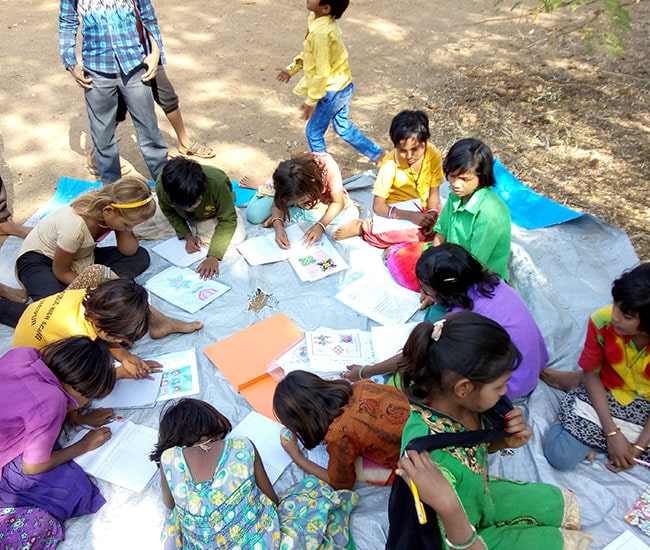
Adharshila Learning Centre
Background
Having been associated with people’s movements for almost two decades, Amit and Jayashree realized that struggle and constructive action had to go hand in hand. They were also clear about working in a non NGO framework. So in an attempt to figure out a model based on people’s participation, in 1998 Adharshila Shikshan Kendra was born with the help of the Adivasi Mukti Sangathan. It was evident that mainstream educational systems were merely giving out facts and information, with the essence of learning entirely missing. Adharshila was envisioned as an alternative leaning centre.
(Website, Naatak India Company)
(READ ADHARSHILA’S LATEST NEWSLETTER)
Adharshila Learning Centre is located on a hillock in the village of Saakad, 6 kilometres away from the town of Sendhwa in Badwani district of Madhya Pradesh. Upon entering the premises, one is greeted with words like “Why?” “What?” “How?” painted on the pillars of the main hall. The essence is to question, which is encouraged through various fun filled activities. There is hardly any wall that has been left blank—images of freedom fighters reminding one of the influences that shape the thought processes at the school; the names of common chemicals painted in Hindi, so that students can learn tough spellings easily when they pass by. The idea is to have words and concepts surround the children as they move around the campus so that they become familiar.
While Adharshila is formally run by Veer Khajiya Naik Manav Vikas Pratishthan, Amit, Jayashree, Badri bhai, Devika behen, Majali, Shewanta and Shanta oversee the day to day activities. The 13 year old learning centre also has senior students as informal monitors who look after the daily affairs of the school—be it taking charge of the dining hall, getting a broken shed repaired, or leading younger children in their project work. (Adharshila Teachers)
Adharshila has a dynamic group of supporters with a constant influx of volunteers who have left their impact on the learning centre, sharing important lessons and insights with those at the school. (Visitors)
In 2010-11 there were 100 students living and learning at Adharshila, the majority being from tribal communities. The students are part of different groups depending on their age and their ability to grasp what is being taught. The kindergarten group is called Beej (seed), while the other groups are called Yamuna, Kaveri, Brahmaputra, Krishna, Amazon, Nile and Octopus. Regular discussions and focus on critical thinking make the children aware of their own society and their tribal identity.
The standard text book format is avoided, making way for students to learn following an interdisciplinary process. Educational materials have been developed so that children can learn on their own as it has been found that children are more serious when they work on their own than in classes with a teacher.
While the younger kids keep the classrooms and school grounds clean, the older kids maintain the library, handle electrical problems, run small shops and a school bank, and even treat their sick or injured classmates. The curriculum has been kept flexible so that academics, world issues, practical skills and cultural heritage can be combined into a wholesome learning experience, while keeping the joy of learning alive. (Programs at Adharshila)
Inspired by Paolo Friere’s ideas of popular education, the founders, Amit and Jayashree, have untiringly striven towards inculcating a hunger for learning in the children by getting them to be aware of the issues faced by their community and the world at large. Most of the students are children of farmers and hope to innovatively expand organic farming initiatives which constitute a significant aspect of the learning at Adharshila. (Organic Farming at Adharshila) Many of the students who studied here are now studying in college and continue to be associated with Adharshila in different ways. One senior team member of the centre has started a school in a very remote village in another district about 200 km away. Two other schools are being run by teachers trained at Adharshila.
The Right to Education Act of 2010 poses a problem to schools like Adharshila. Since now all the children below the age of 14 have to be enrolled in a registered school and the Act does not include alternative schools, students and parents are left confused. Even if they prefer the freer and more enriching atmosphere of Adharshila, the Act is forcing them to choose the formal system. Efforts are on to evolve a suitable solution.
Stories
Adharshila Teachers
With an attempt towards making learning more relevant for the younger students, older students at Adharshila have taken up the role of being teachers. They are thus able to refresh their memory as well as understand the need to be patient and empathetic towards those younger to them.
In 2010, it was decided that each teacher would be assigned the role of managing all the aspects of running the school for one whole month. This was done with an aim to get them to understand the finer nuances of running a dynamic institution like a school. So now, whenever the need arises, teachers can readily take up any managerial responsibility.
One of the senior most teachers is Majali Janu Jadiya. She was a student at Adharshila since the very first day. Discussions on caste and patriarchy led her to drop her last name—Janu is her mother’s name, and Jadiya her father’s. She has been trained as a health worker and is now the school doctor.
Visitors
Almost every month, the Adharshila campus is host to guests from different parts of the country and world. They arrive with the intention of observing and learning about the school, and leave behind their own imprints. These volunteers offer their skills and expertise, imparting them to eager children free of charge.
Local visitors are also a regular feature at the school. Sumali Bai, an activist from Adivasi Mukti Sangathan (AMS) was invited to hoist the flag on Independence Day. The idea stemmed from one of the children’s drawings, who drew a woman hoisting the flag. At the function, Sumali Bai spoke of the various freedom fighters and tribal leaders who sacrificed their lives to fight for justice for their people. Another year, a senior village midwife Lohangya Bai, who has delivered two generations of children in Saakad village, was invited for Independence day events, emphasizing the importance of traditional knowledge.
Since fuel wood constitutes a major cost in running the school, resource persons from others NGOs were called in to conduct workshops on designing energy efficient and smokeless chulhas in the kitchen. Students from other affiliated schools also participated in the workshop where they learnt the basics of energy and how to build chulhas.
Programs at Adharshila
From authoring a book to learning practical skills such as painting and masonry, from attending talks on environmental problems to selling their homegrown organic farm produce in the markets, Adharshila’s students participate in a number of exciting projects. Workshops, camps, surveys and tours form important tools for learning and engaging the children creatively on various issues. Camps on health, crafts, origami, story telling, journalism, Math, animal husbandry, village development, journalism and tribal history have been held.
Adharshila initiated an innovative project for children where they were asked to make rooms for themselves with any available material. What started as a joke has turned into a full time activity where children were fully engaged in building small home like structures with twigs, gunny bags, plastic, cloth and ropes. The kids included water pots, allocated washing spaces with proper drainage, clothes lines, curtains, small brick enclosed verandahs, a common open space with park-like benches and racks for books.
The students also visited an NGO in Badwani for a week to learn screen printing techniques. The intention was to set up a screen printing unit that would be set up in the premises of Adharshila in order to print books for the school. Having collected folk stories, the children authored a book, Kahanin Petaro that was published in the local dialect of Bareli and had illustrations by the children. The book was published by Adivasi Reeti Bachao Toli, Indore. Along with this, various text books have been adapted and rewritten in Bareli. Adharshila has been working towards building quality reading material for the youth, advocating progressive and democratic ideas.
Some students of Adharshila formed a theatre troupe called Naatak India Company. The children have themselves written plays portraying issues such as health and liquor poisoning. One of their most widely appreciated works has been the 90 minute play ‘Hum Kahaan Ja Rahe Hain’. It revolves around various aspects of tribal society and how it is being misled by the market forces and politicians. The production is a mammoth effort, and yet all of it has been developed in-house by the students, by using whatever material they could lay their hands on.
Organic Farming at Adharshila
Farming is one of the main themes of the educational programme at Adharshila, with an aim to address the needs of the region. Adharshila’s five acres of farm land has never been treated with chemical fertilizers or pesticides, and students and faculty members have been trying to improve the soil by applying tested techniques of organic farming under the guidance of experts in the field. The children learnt how to make pesticide from leaves and soil enriching biomass.
In 2006, Adharshila reaped about 500 kgs of vegetables and did not have to venture to the market for four months. In 2009, the organic farm produced about 12 quintals of vegetables and pulses. The produce includes rice, pulses, tomatoes, brinjal, beans, radish, onions, garlic, coriander, methi, etc. Efforts have been made to sell the produce in the Sendhwa market, and create awareness about organic farming and the perils of chemical pesticides.
The over arching aim has been to make Adharshila a self sustaining unit. There has been a conscious attempt to preserve and propagate all the varieties of trees found in the area. The little nursery in Adharshila is taken care of by the children with each group being allotted a tree plot.

